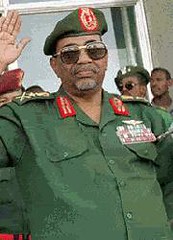
Sudanese President Omar al-Bashir waves to supporters. A new agreement has been reached with Darfur rebels to end the conflict in the western region.
Originally uploaded by Pan-African News Wire File Photos.
Sudan, rebels accept Darfur ceasefire
Sudan and rebel groups, prodded by a visiting US politician, agreed on a 60-day ceasefire -- plus diplomatic efforts by the United Nations and African Union -- to end the conflict in Darfur.
In a joint statement, New Mexico Governor Bill Richardson and his Sudanese hosts, including President Omar al-Beshir, said that ending the conflict was the "highest priority" for Sudan and the international community.
The conflict has left some 200,000 dead and displaced two million others in nearly four years, according to UN figures disputed by the Sudanese authorities.
Peace could only come through a political settlement on the basis of the Darfur peace agreement that Sudan signed with the main rebel Sudan Liberation Movement in Tanzania's capital Abuja in May last year, the joint statement said.
That pact -- which was not signed by other rebel groups in Darfur -- called for the disarming of both insurgents and government-backed Janjaweed militia held responsible for widespread violence in the western province.
"Both sides agreed that there was a compelling need for a comprehensive ceasefire to launch a political process based on the Darfur peace agreement that would lead to a durable end to the conflict as soon as possible," the joint statement said.
"Both agreed to a 60-day cessation of hostilities by all parties within the framework of the Darfur peace agreement, accompanied by a start in African Union (and) United Nations diplomatic efforts."
A peace summit would follow "at the appropriate moment" but no later than March 15, the statement added.
Speaking to reporters in Khartoum, Richardson quoted Beshir as saying that he agreed to the proposed ceasefire "as long as it goes in line with the Darfur peace agreement."
Asked when a ceasefire might begin, Richardson said a date would be set through negotiations between the Sudanese government, factions in Darfur, the United Nations and the African Union.
"I met in Darfur several leaders of the rebel factions, including the Justice and Equality Movement and Sudan Liberation Army which have not yet signed the Darfur peace agreement," he said.
"They told me that they would agree to the cessation of hostilities."
Richardson came to Sudan with a delegation sponsored by the Save Darfur Coalition, the leading US-based Darfur peace advocacy group.
Others he met during his visit included Foreign Minister Lam Akol and, in Darfur, rebel faction leaders and government and humanitarian officials.
The governor was due to meet later with UN interim special representative for Sudan Jan Eliasson, who arrived in Khartoum on Tuesday with the stated intent of getting rebels to sign the peace deal.
The war in Darfur erupted in February 2003 when rebels from minority tribes in the vast western province took up arms to demand an equal share of national resources, prompting a heavy-handed crackdown from Sudanese government forces and their Janjaweed proxy militia.
Richardson, who is often mentioned as a possible 2008 Democratic presidential candidate, has a long history of dealing with foreign leaders not friendly to the West.
In 1996, he came to Sudan where he secured the release of an American pilot and two Red Cross workers who were being held hostage by Sudanese rebels.
In September last year, he successfully negotiated with Beshir the release of US journalist Paul Salopek, who was being held in a Sudanese prison on espionage charges.
No comments:
Post a Comment